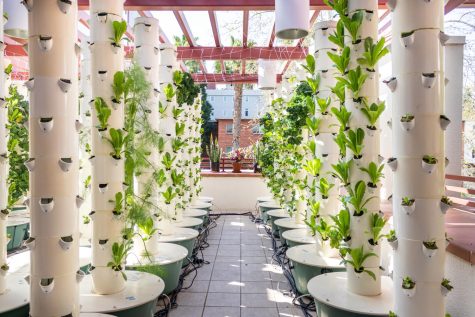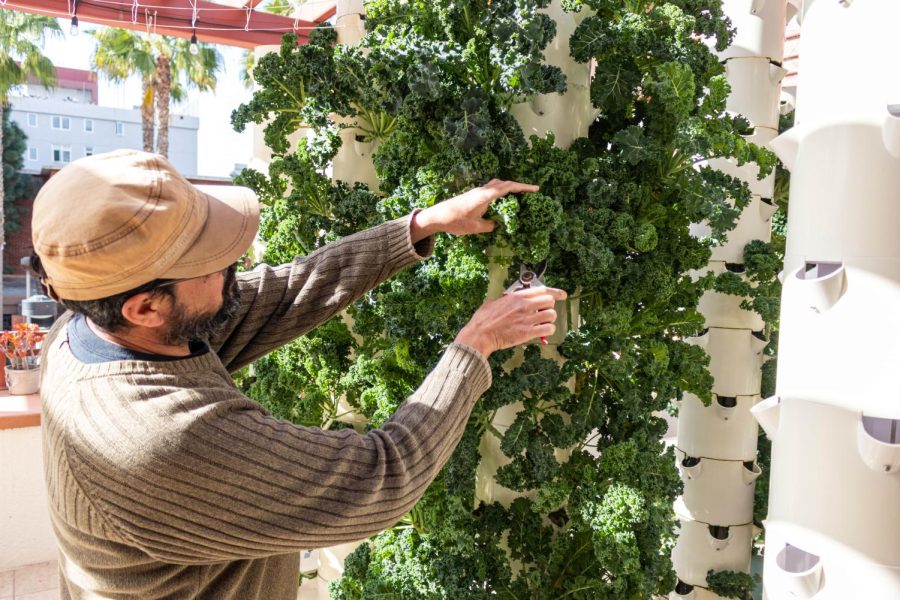Tucked under the pergola on the second floor of Cuicacalli Suites are aeroponic towers that provide campus grown produce for the Garden and other San Diego State University Dining chefs across campus.
These aeroponic towers aid the SDSU Campus Grown program’s commitment “to providing the campus community with menu options that are responsible and sustainable.”
The towers and soil beds on The Garden patio and the Hello Walkway can produce lettuce, kale, arugula, basil, parsley, cilantro, thyme and rosemary. The aeroponic towers can grow any type of produce except root vegetables.
The Campus Grown initiative began in 2016 after representatives from SDSU dining were introduced to aeroponics at a National Association of College University Food Service (NACUFS) conference.
Paul Melchior, the current director of SDSU dining, was a part of the group that spearheaded the Campus Grown initiative. As the former executive chef, Melchior knows the benefit of fresh produce.
“I like to grow items in my home and there’s no comparison to picking a cucumber from your garden and eating it that day than buying it in a store,” Melchior said. “It’s crisper, it’s fresher, it’s the ultimate nutrition.”
After purchasing the first five towers, SDSU dining secured backing from the PepsiCo sustainability fund to support the procurement of the remaining 50 towers in their current portfolio.
During COVID-19, the aeroponic gardens were shut down for almost a year.

Naomi Rabino, a sophomore majoring in business administration finance, began working as a gardener when the aeroponic gardens restarted in the spring of 2021.
“I used to volunteer at a botanical garden back in my hometown. And so once I saw the job opening I was kind of still interested in gardening as a hobby,” Rabino said.
Rabino works with Ted Poirier, the lead gardener of Campus Grown, who started in september 2022. Poirier manages the intricate process of balancing nutrient and pH mixtures, maintaining the towers, harvesting crops and processing produce for use by SDSU chefs.
The process begins in a seedling table of 50 rockwool cubes that hold seeds. Water that includes a small amount of the mixture used to feed the plants in the towers is pumped and drained into the bed of cubes twice daily.
Once the seeds germinate, the absorbent cubes containing the sprouts are separated and transferred to the aeroponic towers. Instead of growing in soil, the plants continue their growth aided by a water mixture that mimics nutrients in soil. A dosatron pump allocates minerals and nutrients into a gravity tank holding the mixture. From there, the mixture is distributed to inlets that pump the individual towers. The towers hold the rockwool cubes vertically where the nutrient mixture showers from inside the top of each tower as the roots grow in air.
“The advantage to (aeroponic towers) over growing in soil is you’re using a lot less water because you’re recycling the water,” Poirier said. “The problem is you’re completely electricity dependent.”
While the nutrient mixture is stored in a gravity tank filled using water pressure, each tower relies on an electric pump to transport the water mixture to the top of the tower. Poirier said that rain often disrupts the pump’s power, which cuts off the water to the plants.
“In my opinion, it requires a human being checking on (the towers) at least every 24 hours,” Poirier said. “Otherwise, you could lose a lot of your crops.”
Working with the demand of ingredients needed by chefs does create challenges for distribution, especially due to the limited shelf life of fresh produce.
“It’s a fine balance because you know the way that kitchens work, (for example) when (chefs) need something, they need it now,” Poirier said. “What we try to do is let them know what we have every week the day before they order produce.”
The Garden has a compost program that is hidden behind the “please bus yourself” placards scattered around the dining hall. The Garden asks students to place their dirty dishes “as is” on trays to be processed by dishwashers. The “please bus yourself” system allows for excess food to be separated and composted instead of being trashed.
In combination with the compost collected from University Towers Kitchen, the Faculty Staff Club and from leased restaurants, Aztec Shops diverts approximately 300 tons of waste annually. The compost collected is sent to the Miramar landfill where it is processed and available for any San Diego resident to pick up free of charge.
In comparison to ordering from a supplier, there is significantly less waste with the aeroponic garden.
“If you’re getting a case of romaine from a produce company, it’s wrapped in plastic, then it’s wrapped in a cardboard box and then it’s carried in on a pallet,” said Andre Alto, the general manager of The Garden. “The pallet, sure, can be recycled. The cardboard gets recycled, but it’s all waste. You know when we can literally go out there with a pair of scissors.”
Despite this, the aeroponic towers are not necessarily more cost effective for the university than ordering from a supplier.
“It’s expensive, but sometimes you have to pay that expense because of the product that you’re getting out of it,” Alto said. “That’s what we believe here is providing a better, healthier product for the students on campus.”
When produce is ready, the crops can be harvested and washed on site for use in the salad bar or by other SDSU chefs. Alto said that a full harvest of lettuce from the aeroponic towers located at The Garden and the Faculty Staff Club can feed 1,000 students. The produce grown from the towers are free of fertilizers and pesticides but cannot be considered organic because the crops are not grown in soil.
The aeroponic towers do not grow the amount of produce that is advertised to prospective students on SDSU’s famous red-polo tours.
“I’ve heard (campus tours) saying we grow 3,000 heads of lettuce a week. I’m like, ‘hey, no, no.’ A year maybe,” Poirier said. “I think over time the myth has kind of grown. We definitely can grow two to 400 heads a week at peak production.”
Students who are interested in working as gardeners to aid the Campus Grown initiative can visit the Aztec Shops website for more information.







